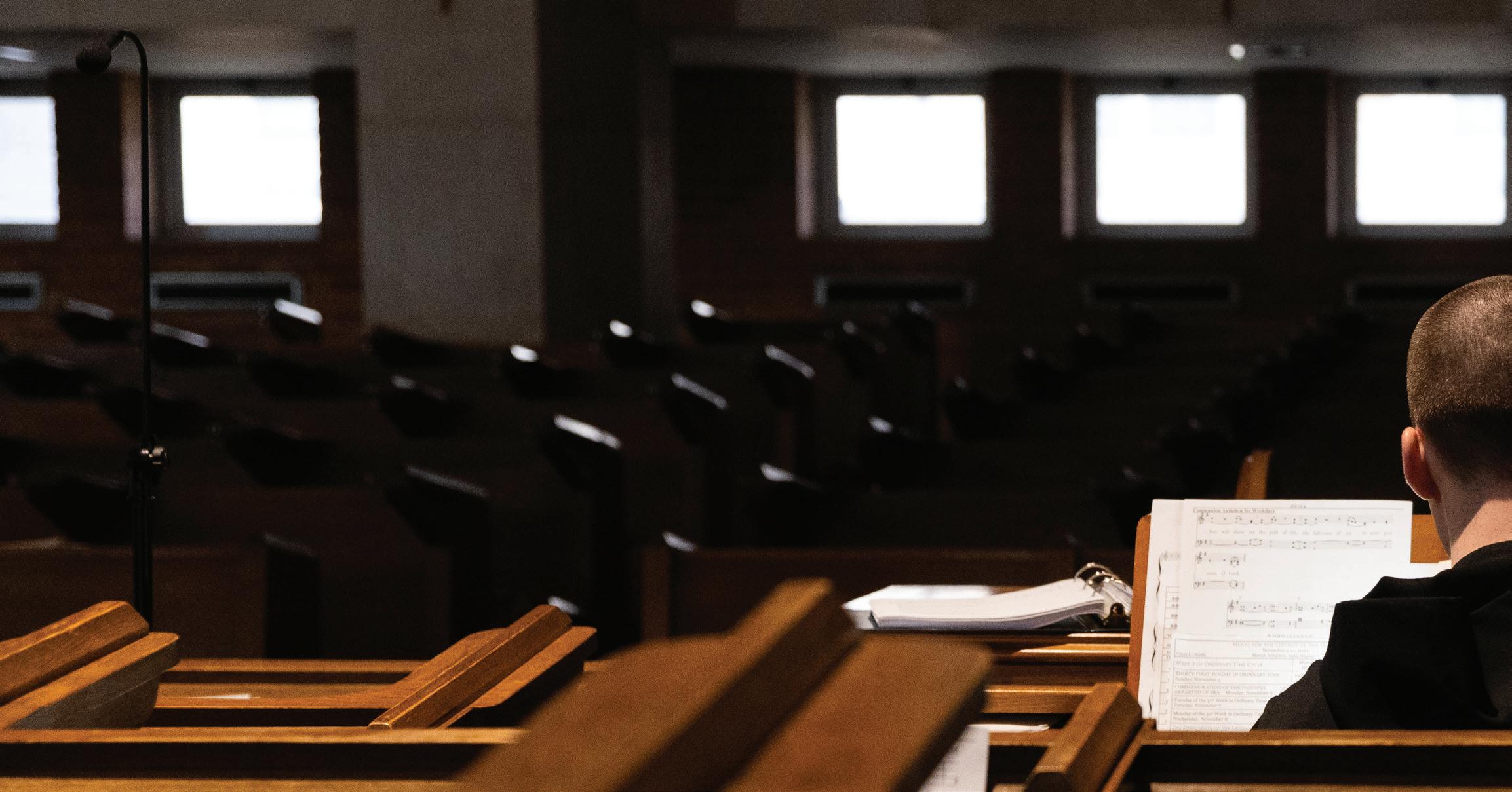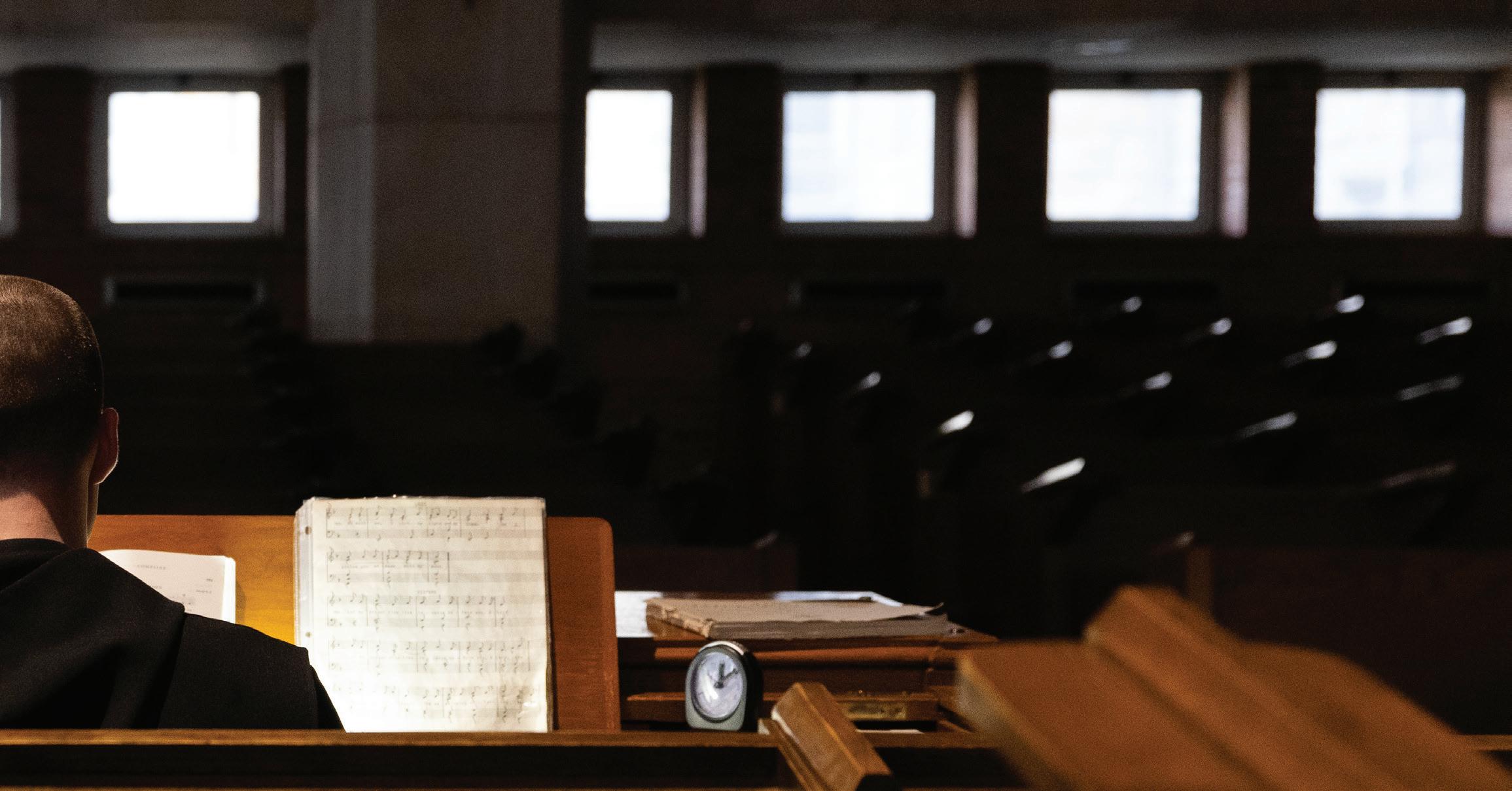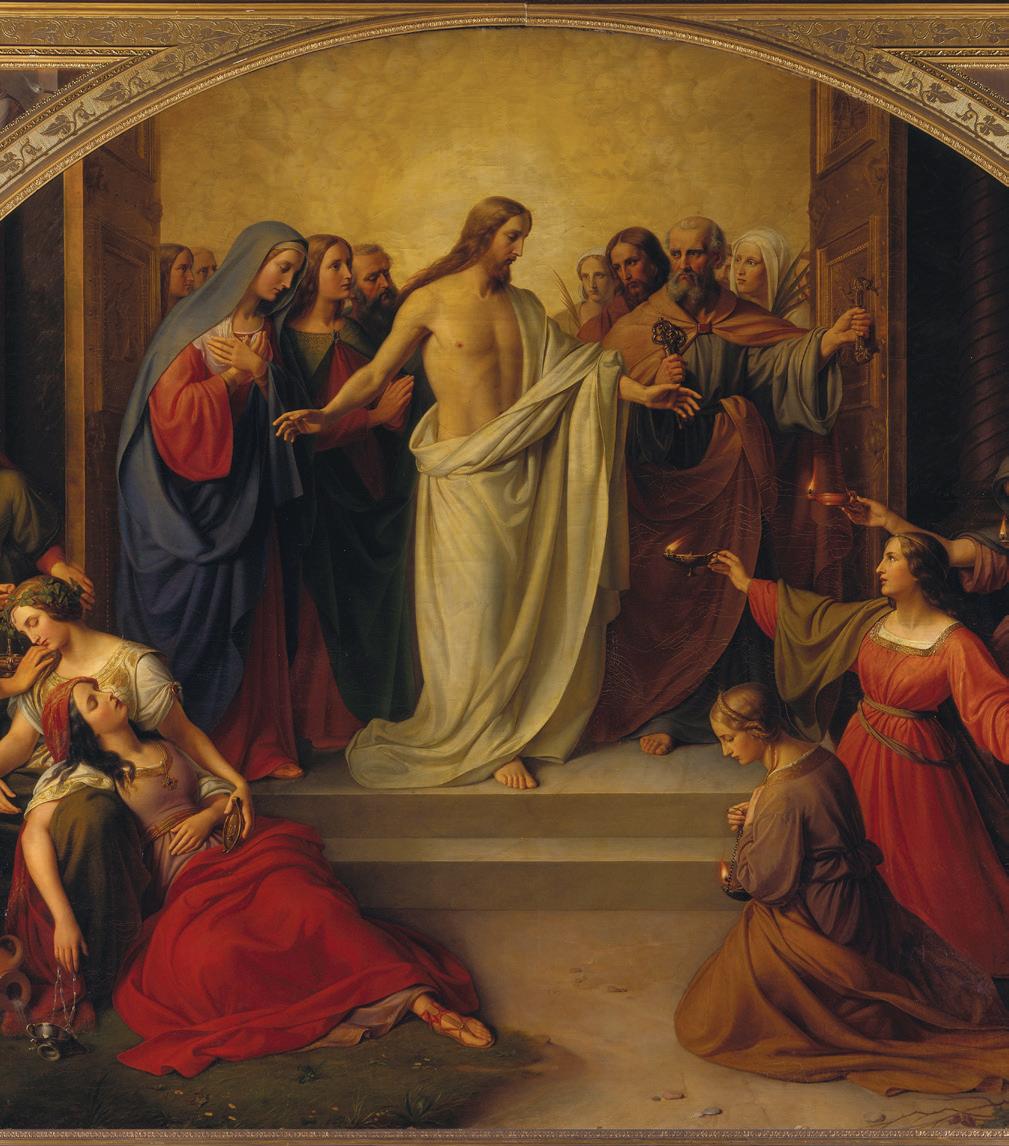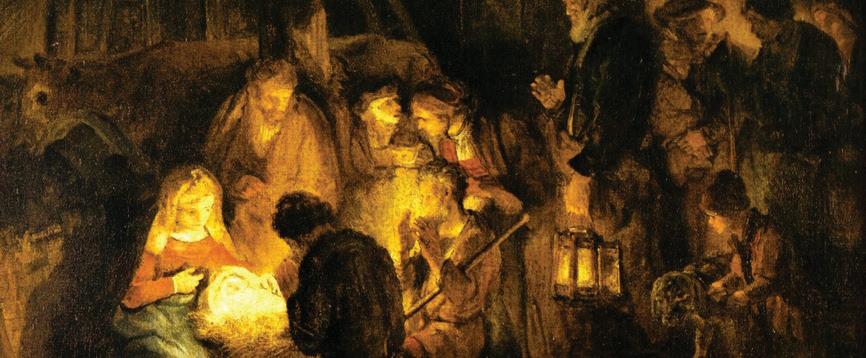
13 minute read
on the Liturgical Year
By The Monks of St. Benedict’s Abbey
3 DECEMBER – 1ST SUNDAY OF ADVENT
Fr. Jay Kythe, O.S.B.
Haveyou ever said that “a part of me would like to do…” or “a part of me feels …”? We all have said something like that. We are created with “parts” or different roles we may take on at different times throughout our lives. Part of the great adventure of life is that these roles keep changing and shifting.
In this Gospel reading for the First Sunday of Advent, we have the image of a man traveling abroad and leaving his household in the hands of servants. If we were to consider this household as our soul, there would be different “parts” of us assigned to different tasks. And a very important role is that of a gatekeeper. The traveler assigns him the role to “keep watch.”
What is he to do when he keeps watch? First of all, it is for the traveler, waiting patiently for his return.
Other servants do other things; a busy mother will be taking care of the children, a young man will have to study, a part of the person acts as a caretaker of the household, of infirm family members, of pets, and so on. That same person may have a gatekeeper, watching and waiting for the presence of Christ.
That same gatekeeper would have to keep out undesirable passers-by. For us, that could be all the temptations we suffer, bad news we hear that threatens to disturb us, distractions that pull the gatekeeper away from waiting for the owner of the house. That same gatekeeper would have to keep messengers of the owner in, the messages we can get when we kneel down and pray.
By now it must be clear as to who this traveler is: it is the Lord! And He asks us to “Be watchful! Be alert!” In the ordinariness of daily life, it is easy to become sleepy. It is easy to doze off and awakened by the cry, “The Bridegroom is here!” as the ten wise and foolish virgins had heard. It is easy to be distracted and not see Christ in the distressing disguise of the poor one standing before me.
In the Gospel story, the traveler puts the servants in charge, especially the gatekeeper, and entrusts them with this task, to keep His property safe. In other words, this Divine traveler places a lot of trust in you! Trust can also be expressed in other words: confidence, reliance, and dependence; however, the best word is faith. When we make an act of faith, we place ourselves in God’s hands. And that act of surrender, done daily, keeps us from falling away and helps us to “stay awake!”
God has put His trust in you; can you trust Him?
10 DECEMBER – 2ND SUNDAY OF ADVENT
Fr. Marion Charboneau, O.S.B.
Our Mass this Sunday will open with a prayer to remind the faithful that we are called to holiness in a world that can distract us. Our Collect, prayed by the celebrant, will be that “no earthly undertaking hinder those who set out to meet your son.” Indeed, much of the world is dangerous, hampers us, and may prove spiritually fatal. In those words, in a prayer that asks anything unholy and evil in our lives be nullified, we will meet Jesus Christ in the Mass.

Our encounter with Jesus in the Gospel will take the form of Anticipation. We will encounter Jesus in the prophesying of John the Baptist on the banks of the Jordan, proclaiming Jesus as one to come. John was a powerful and jarring figure in himself, clothed in camel’s hair and eating locusts and honey, and he was not just impressive in appearance, but in his word and preaching.
John the Baptist was the messenger “crying out in the desert,” calling his people to prepare for the Messiah, calling everyone into a “baptism of repentance for the forgiveness of sins.” It was a message powerful in its day. For Jews, baptismal rituals and washing were common, reminding them of the God who brought Israel out of Egypt, led them through the Red Sea, and blessed them with the covenant at Mt. Sinai. John’s baptism reminds of that, but John isn’t the herald of the past; John the Baptist is the herald of a New Age, John proclaiming it by announcing a baptism even greater than his own. John saw his own work and his baptism as only a prelude to what is present and given to each of us this Sunday at the Mass: Jesus, as the Messiah in the Spirit of God, bringing about a new forgiveness and mercy able to transform human existence into an era of everlasting love, peace, and salvation, never to be broken.
What we know by faith is that we’ve seen it all taking place. To go to the Mass conscious of this is to truly know the Good News and to participate in it. Indeed, we enter into the accomplishment of it in Jesus’s Death and Resurrection. Bread and wine become his own body and person in risen glory, and that is given to us as food and fuel for our own earthly lives, with Jesus renewing us and dwelling in us as the beginning of eternal life with him. If we recall that opening prayer with any honesty, we have to admit that in our sinfulness we’ve given ourselves over to all kinds of evils that hinder us. God in his love has responded with great mercy, in the Baptism we’ve received from Jesus Christ, and in the gift of his body and blood. For that, we will present ourselves to him on Sunday, responding to his gift with the offering of our own lives.
17 DECEMBER – 3RD SUNDAY OF ADVENT
Fr. Meinrad Miller, O.S.B.
Onthis Third Sunday of Advent the Church celebrates Gaudete, or “rejoice” Sunday. The readings at Mass remind us why we have cause for rejoicing. In the first reading from Isaiah 61, we hear of the wonderful new that the spirit of the Lord God is upon me.
That first reading ties in well with the Gospel in which we see another man, St. John the Baptist, filled with the Holy Spirit, preparing the way of the Lord. We know that St. Benedict had a devotion to St. John the Baptist, for whom St. Benedict had a chapel dedicated at Monte Cassino. It was precisely the fidelity and humility of St. John the Baptist that caused Our Lord to commend him in Matthew 11:11 Amen, I say to you, among those born of women there has been none greater than John the Baptist; yet the least in the kingdom of heaven is greater than he.
Perhaps the greatest testimony to the presence of the Holy Spirit in John is his humility. He does not take the occasion to draw attention to himself. Rather he gives witness to Christ clearly when he says the one who is coming after me, who sandals I am not worthy to untie.

One person who recognized Christ present in our own age was Saint Mother Teresa of Calcutta. Even though she went through years of darkness and desolation, she had faith that the one who had called her to minister to Him in the poorest of the poor was truly with her, guiding her. Her life was one of decreasing so that Christ might increase.
In this final week of Advent, we rejoice also in Our Lady, filled with the Holy Spirit, who gave her “fiat” so that we might be set free. As we await the Birth of Jesus as monks, oblates, families, and friends, let us too rejoice that the Holy Spirit prepares our hearts to welcome so great a Redeemer as the newborn Prince of Peace, our Lord Jesus Christ.
24 DECEMBER – 4TH SUNDAY OF ADVENT
Fr. Gabriel Landis, O.S.B.
Before speaking about the Annunciation found in Luke 1:26-38, I want to speak about the Book of Daniel, where the Archangel Gabriel makes his first appearance in Holy Scriptures. In the Book of Daniel, anytime that the Archangel Gabriel appears to Daniel, he is greatly afraid. In his first appearance recorded in Daniel 8:15-17, Daniel say, “When he came near where I was standing, I fell prostate in terror.” In Daniel 9:21, he appears to Daniel again “at the time of evening offering.”
In Luke 1:9, the Archangel Gabriel appears to the priest, Zechariah during the time of offering incense, which was done at the time of morning and evening offering. Zachariah’s reaction was very much like Daniel’s; in Luke 1:12, it says, “Zechariah was troubled by what he saw, and fear came upon him.”
In the Book of Daniel and in Luke 1, we see very terrifying appearances to Daniel and Zechariah. From the Archangel, Daniel is told of the end of times. He is frightened by the appearance of Gabriel as well as his message. Zechariah, was fulfilling his priestly duties and had been chosen by lot to make the offering of incense. Luke 1:11-12 says, “the angel of the Lord appeared to him, standing at the right of the altar of incense. Zechariah was troubled by what he saw, and fear came upon him.” The detail about Gabriel being on the right side of the altar of incense is important. Jewish thought held that being on the right side is a sign of favor. The Archangel Gabriel, standing on the right side, told Zechariah that he and his wife in their old age will have a child. Remember, Zechariah is a priest. He has been chosen by lot to offer incense, most likely at the same time the Archangel appeared to Daniel. He, like Daniel, is terrified. Yet he doubts the words of the Archangel! As we know, the Archangel is not happy with his lack of belief, so he punishes him with being mute until the birth of John.
The Annunciation, which immediately follows the Archangel Gabriel’s appearance to Zechariah, follows a similar pattern. Both Zechariah and Mary are troubled by the vision. Luke 1:29 says, about Mary, “she was greatly troubled at what was said.” Gabriel goes on to say to her that “Behold, you will conceive in your womb and bear a son, and you shall name him Jesus.”
After objecting that she is a virgin, Gabriel tells her,
“The Holy Spirit will come upon you, and the power of the Most High will overshadow you.” He then goes on to tell her that her cousin Elizabeth is pregnant as well, and, “Nothing will be impossible for God.” However, unlike Zechariah unbelieving response, Mary responds by saying to the Archangel, “Behold, I am the handmaid of the Lord. May it be done to be according to your word.”
It is striking how artists have conveyed these appearances of the Archangel Gabriel’s appearances to Daniel, Zechariah, and Mary. Often Daniel and Zechariah are portrayed either bewildered or in fear. In the Annunciation of Jesus, Mary is portrayed as being in a state of prayer. She is listening to the words of Gabriel, no longer in fear, but in an attitude of obedience. The Archangel Gabriel, often portrayed as a terrifying angel to Daniel and Zechariah, is sometimes portrayed as not even being able to meet her eyes. He often has his head bowed before the Mother of God.
My point is this: God always wants us to listen to Him. He desires that we follow what He teaches, and what He wants for each one of us. To Daniel and Zechariah, God got his points across to them. They loved God, but they were terrified of his messenger, Gabriel. Mary loves God to the point that she moved beyond fear. She understands Gabriel’s words to her that she will be the mother of the promised Messiah. She will become the Mother of the Savior of the World. Her response to answering God’s will is a powerful encouragement to us. Her life as Jesus’ mother was not easy. But her willingness to achieve God’s will be fruitful to us all. May we all, when God’s will might frighten us, respond, “May it be done according to your word.”
25 DECEMBER – THE NATIVITY OF THE LORD

Abbot James Albers, O.S.B.
Inmeditating on the Solemnity of the Nativity of Our Lord, we reflect upon the power of intercession, how the Incarnation makes possible our ability to ask for and offer intercession. Through the birth of Christ, God becoming human flesh, the plan for our salvation was revealed in the quiet night. Veiled in that cave and in the child, Jesus was the nourishment for our journey of Christ’s Body and Blood, the defeat of death and victory of life, the resurrection of the body, the Communion of Saints, Mary and Joseph, and all the angels and archangels, all interceding for us, championing us on our journey – all wrapped up as a new-born child. Emmanuel, God-with-us, the Word made Flesh, quietly intrudes into the life of man to bring to life our hope.
We are not in this alone: you interceding for me, and I and the other monks interceding for you, the entire Body of Christ lifting up prayer like incense, pleading to the one who became one of us, pleading to those holy ones who have fought the good fight, have finished the race, and have kept the faith. God in his Word made Flesh makes this all possible, and we ask him once again to quietly – and maybe sometimes with a mighty sound – intrude into our lives, to intercede.
Consider the power of intercession as the action of intervening in the life of another, intervening for another. God intervened in human history to set it right and establish it in the Kingdom of Heaven. God, the Word, the Second Person of the Holy Trinity, intervened in human nature to negate that which had gone before that marred the very soul of man.
Most importantly, however, God intervenes in each of our lives individually, to save not only mankind, but to save you, and to save me, to intercede. From that moment in Bethlehem, interceding becomes our way of encounter with God. It is important that we understand this, not only to make way for God to intervene in our lives, but because we are called to mirror, to echo this intervention of God in the lives of others, in society, in our culture, in our prayers of intercession. God wants us to be the pesky widow of the gospel, pestering, intervening, encountering the newborn child who comes to us and to others.
As we celebrate this season of Christmas, let us remember that the Son of God took flesh in a world where people make choices. It is a world where we all have our priorities, our goals, our vision of what would be best for our lives. God’s invitation to us, his intercession in our lives does not always fit with our preferences. That is when we are called to love the most, to deny ourselves.
We, like St. Joseph, are called to give our assent, to respond in freedom, and to play our role in the unfolding of God’s salvation in the world – to intervene and intercede. This Christmas, let us turn to St. Joseph and the Virgin Mary as our example, to serve Christ with concern for God’s will, and with faith and love. Let us set aside that sin which keeps us from encountering the Word made Flesh. Let us do what needs to be done in order to participate more fully in the new life that our Savior offers us. Let us especially be attentive to those who are weak, vulnerable, and displaced, for they are the reflection of the Nativity scene – they intercede in our lives.
Let us celebrate this glorious feast of our salvation by loving and serving him who has so gloriously intervened and interceded in our lives.
31 DECEMBER – FEAST OF THE HOLY FAMILY
Br.
Angelus Atkinson, O.S.B.
Today is the feast of the Holy Family— the family of Jesus, Mary, and Joseph. The communion antiphon for the Mass today is an interesting choice. We do not hear of the Holy Family in the peace and wonder of Bethlehem, but rather we are presented with what could be described as the confrontation of the Holy Family. It takes place after Mary and Joseph lose the twelve-year-old Jesus during their pilgrimage to Jerusalem for the Feast of Passover. Returning to the Holy City to search, they find Him speaking with the elders in the temple on the third day.
Mary addresses Jesus in these words:
Fili quid fecisti nobis sic? Ego et pater tuus dolentes quaerebamus te. Son why have you treated us in this way? Your father and I have been worrying and searching for you.
It is a sentiment that parents from Adam and Eve onward can recognize‒What are you doing to us? Ego is drawn and rises to a height on pater tuus… I and your father… Do you not realize what pain you are causing us? Mary and Joseph’s bewilderment is understandable, but what happens next reveals that there is something different before them. What they thought was the problem—a forgetful kid— was not the real problem. Jesus opens His mouth and breaks for a moment the long silence of the Gospel that hovers mysteriously over His formative years as a child and adult before His public ministry.
He replies:
Et quid est quod me quaerebatis? An nesciebatis quia in his quis patris mei sunt, oportet me esse. Why were you seeking me? Did you not know that I had to be about the things of my father?
Here too the phrase rises to a height on patris, “Father.” It is a singular moment, a moment of distance and also of revelation of a deeper union, in which Jesus reveals His true identity, which has been up until now hidden in the shadow of the foster fatherhood of Joseph. He is with His father. He has never left His father’s side. He is about the Father’s business.
There is a beautiful prayer garden on the grounds of the monastery which meditates on these events as the Holy Family returns to Nazareth. In it, Mary looks at the child Jesus who has paused in their walk to look back towards Jerusalem, the place of His final destiny, the place of his last supper, his crucifixion, resurrection, and ascension to the Father’s side. For a moment he has increased the distance between him and Mary and Joseph. But Mary, with her hand on the breast that nursed this child, looks upon Him as only a mother can, with tenderness, wonder, and sorrow in her eyes. In this moment she embraces the pain of this new distance, and this embrace gives birth to a greater recognition of the Mystery that is before her, the Mystery carried in this child, that she has borne in her flesh, that belongs to her, and yet only insofar as she acknowledges that He belongs to an Other, to the One who draws her and all who become familiar with her son to destiny.
As we look upon them we can see that this is also what we desire for our own life, our own family and friendships‒if every problem were brought under our control, would we be happy? Rather, is it not greater to discover in every confrontation, a Presence that embraces everything and can bring it to its fulfillment? This is the embrace of the Father and in Christ it is always possible for us to be with Him in all things. We can ask Mary and Joseph to pray for us that we may also be given the grace of this new possibility in the light of Christ’s presence today.




